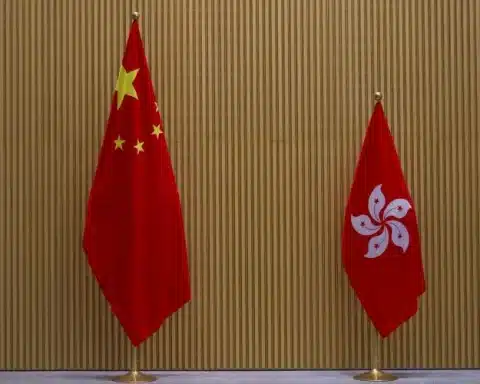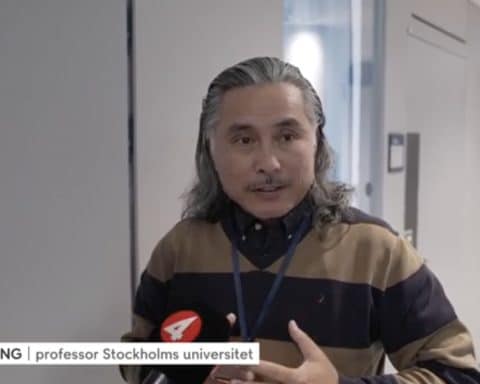This text is written by Susanne Berger, senior fellow with the Raoul Wallenberg Centre for Human Rights.
Swedish citizens Dawit Isaak, Gui Minhai and Ahmadreza Djalali are essentially foreign political hostages. Sweden’s official handling of their cases needs to better reflect this reality.
After 22 years, the trauma of Swedish-Eritrean journalist Dawit Isaak’s unlawful imprisonment in Eritrea continues unabated – cruelly, inexorably, with no end in sight.
Dawit Isaak is currently one of the longest imprisoned journalists in the world. He was arrested in 2001, exactly 8,000 days ago today, along with about a dozen colleagues, during Eritrean President Isaiah Afwerki’s crackdown on independent media.
Just last month, in a sharply worded opinion, the United Nations Working Group on Arbitrary Detention (UNGWAD) expressed its “utmost concern regarding the […] unrebutted allegation that Mr. Isaak has been in pretrial detention for more than twenty-one years without being charged and without any perspective of trial.”
The Working Group called for Isaak’s immediate, “unconditional release” and it took the notable step of referring his case to the Working Group on Enforced and Involuntary Disappearances and the UN Special Rapporteur on torture and other cruel, inhuman or degrading treatment or punishment, among others.
Dawit Isaak has not had any contact with the outside world since 2005.

At a public seminar about Dawit Isaak during the Almedalen political week in Sweden this summer on June 30, the extent of the tragedy was once again on full display.
Despite an engaging discussion, the chain of most recent events seemed only too familiar. It began with a promising statement released by the new government last October, when the incoming Swedish Prime Minister Ulf Kristersson publicly emphasized his commitment to redoubling official efforts to win the release of both Dawit Isaak and Gui Minhai, the Swedish publisher and book seller who has been imprisoned illegally in China since 2015. (His family has not received a sign of life after his sentencing to a ten year prison term during a sham trial in 2020.)
”It’s a strange thing to mourn someone who has disappeared. You talk about the person and catch yourself saying that he was, instead of he is. You find a book on sale that you know he would like, but you do not buy it because you don’t know whether you will see each other again. You send email upon email just to say hi but never receive a response.”
Quote by Angela Gui, daughter of Swedish publisher Gui Minhai, imprisoned in China since 2015.
Despite years of bitter disappointments, Dawit Isaak’s daughter, Betlehem Isaak, who learned of Mr. Kristersson’s statement only when reading the news, felt encouraged. Ten months later, frustration and disappointment have once again won the upper hand.
Aside from the public rhetoric, there are no signs of any significant initiatives. Swedish officials have not even bothered to contact the Isaak family for a basic briefing about its supposedly new and determined approach.
So, the debate in Almedalen this summer took its predictable course, leaving the listeners with the sobering conclusion that both cases remain stuck in the same repetitive feedback loop that has bedeviled them for years.
As an explanation for the government’s months-long failure to communicate, Håkan Jevrell, State Secretary in the Swedish Ministry of Foreign Affairs, cited the need to “properly assess the political situation in Eritrea”, along with the “careful weighing of all available options.” He also tried to reassure the two families that the official silence does not in any way suggest governmental inaction.
Betlehem Isaak politely but firmly cut him short, making it clear that such rote phrases simply do not pass muster any longer. “I do not doubt that you are doing something, I doubt you are doing the right thing,” she replied.
She also pointed out the absurdity of Jevrell’s argument that it would take the government a full eight months to properly evaluate the political conditions in Eritrea. “As a matter of fact, the situation in Eritrea has been pretty much the same, year after year, for the past 15 or even 30 years,” she noted.
The crucial question swinging in the background of this exchange is this: If Swedish officials truly believe Dawit Isaak to be alive, then why do they not show a much greater sense of urgency about his potential rescue?
Betlehem Isaak sees a fundamental problem with Swedish diplomacy: “I believe one of the Swedish Foreign Ministry’s weaknesses is that it actually believes that diplomacy always works with states like Eritrea,” she argued.

Why, after all these years, she asked, is there still so little official focus on the many concrete steps the government can take to pressure the Eritrean regime? The current strategy is clearly not working, Betlehem Isaak added. Why does the government not avail itself of other options?
Options like making it more difficult for the Eritrean regime to raise funds in Sweden; restricting or outlawing altogether the coercive 2% diaspora tax levied on Eritreans living abroad (with dire consequences for relatives remaining in Eritrea if the tax is not paid); tightening immigration and residency rules for individuals associated with the regime; utilizing and enforcing international legal mechanisms like targeted sanctions and criminal prosecutions (under the principle of universal jurisdiction) to hold Eritrean officials accountable for their crimes, including the regime’s egregious human rights violations in Tigray, in closer cooperation with international partners, especially the European Union.
The need for a new policy approach
Given the current impasse, another question is whether both Dawit Isaak’s and Gui Minhai’s cases should continue to be handled primarily through diplomatic channels, meaning the Swedish MFA’s consular department. Both Dawit Isaak and Gui Minhai are, in effect, foreign political hostages. So is Dr. Ahmadreza Djalali, also a Swedish citizen, who has been imprisoned in Iran since 2016.

The traditional model of providing “consular support” to Swedish citizen’s imprisoned abroad seems hopelessly outmoded and is simply not well suited to modern-day realities.
Instead, what seems to be urgently needed is an expanded, highly coordinated policy approach, involving various agencies and officials with specialized training in international crisis management, hostage negotiations, and a background in counterterrorism.
Such a policy overhaul seems all the more indicated given the volatility of the global political situation and the nature of the governments or groups who engage in hostage taking. More likely than not, incidents of Swedish citizens being kidnapped or incarcerated abroad are bound to increase rather than remain a rare exception.
Quite tellingly, the family of jailed Russian opposition figure Vladimir Kara-Murza recently sought “wrongfully detained” status for him in the United States, even though Kara-Murza is a British citizen. (He is also a US permanent resident). Why did they do so? Because the US government currently has one of the most effective foreign hostage recovery teams in the world. Both the UK and Sweden lack such a highly specialized program.

The development in the US is in large part due to the efforts of the James W. Foley Legacy Foundation which provides assistance to American hostages and their families.
Founded in 2015, it is named in honor of James W. Foley, an American journalist who in late 2012 was taken hostage by ISIS in Syria. He and two fellow Americans were brutally executed almost two years later.
Over the past decade, the James W. Foley Legacy Foundation has played a crucial role in reshaping the US government’s hostage policy. Its central tenet is that a country’s wealth lies in its individual citizens, and in particular its journalists who risk their lives so we, the public, can make informed decisions – a cornerstone of any democracy.
At the time of James’ kidnapping, “we were really pretty much on our own”, Diane Foley – mother of James and President of the Legacy Foundation – recently recalled in an interview with CNN’s Christiane Amanpour: “During the first nine months after James disappeared, we received no information, nothing, zero.”
Over time, it slowly dawned on his family that – despite repeated official assurances – they found themselves entirely on their own, with the American hostages, including their son, essentially being treated like collateral damage.
The Foley family was dismayed to find that there was no clear and effective coordination between or even within the various US agencies in charge of hostage issues. As a direct result of the James W. Foley Legacy Foundation’s efforts, President Obama in June 2015 issued an Executive Order introducing important new changes to the US government’s official hostage policy.
They included, among others, the creation of a special Hostage Response Group, a Family Engagement Team, to support and brief family members, as well as the appointment of a US Special Envoy for Hostage Affairs.
The changes were further formalized in 2020 when the US Congress adopted the Robert Levinson Hostage Recovery and Hostage Accountability Act. It led to the creation of an interagency Hostage Recovery Fusion Cell and Hostage Recovery Group tasked “to assess and track all hostage cases of U.S. nationals and coordinate agency efforts to safely recover hostages.”
“We are light years ahead today in government engagement.”
Quote by Diane Foley, Founder and President of the James W. Foley Legacy Foundation.
The results have been impressive. According to statistics compiled by the James W. Foley Legacy Foundation, over the past eight years 122 American hostages have been rescued. Diane Foley feels the changes have provided much needed flexibility for both families and government officials: “Every hostage situation is different. There cannot and should not be a ‘one-size-fits-all’ approach.”
Such policy changes, even if implemented quickly, will come too late for Dawit Isaak – but they may well enhance the chances of rescue for Gui Minhai or Dr. Ahmadreza Djalali, and similar cases in the future.
If anything positive at all can come out of this dismal 8,000 days anniversary, the radical restructuring and re-thinking of Sweden’s formal policy approach to political hostage taking may just be it.
FURTHER READING:
President Barack Obama’s 2015 Executive Order
U.S. Envoy for Hostage Affairs
2022 compliance strengthening under the Biden Administration
The Robert Levinson Hostage Recovery and Hostage Accountability Act
And a video of Christiane Amanpour‘s interview with Diane Foley, mother of American journalist Janes W. Foley, who was kidnapped and brutally executed by members of ISIS in Syria in 2014.
Susanne Berger can be reached via X (Twitter).





